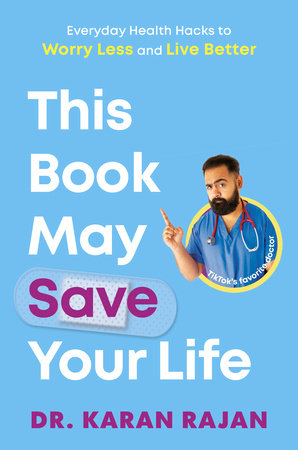- Dr Karan's Weekly Dose
- Posts
- How To Lower Cholesterol, Eye Rubbing Dangers & Runners' High!
How To Lower Cholesterol, Eye Rubbing Dangers & Runners' High!
The Weekly Dose - Episode 93
Gut Health Tips To Maintain Cholesterol!

Cholesterol isn’t always the bad guy – yes, it can cause health problems
But its also critical in building the structure of cell membranes, producing vitamin D and making vital hormones and more.
Some people may need medication to treat their high cholesterol but regardless there are some dietary actions we can take to keep the levels in check:
1. Oats.
These are high in beta glucan, a type of soluble fibre that gelatinises in the gut and helps to reduce LDL cholesterol levels
2. Increase plant content in your diet (fruit, vegetables, nuts, seeds etc).
Plant foods contain sterols and stanols which are natural compounds which are shaped like cholesterol so less cholesterol gets absorbed in the gut.
3. Legumes.
Your gut bacteria thrive on fibre so the more beans you can incorporate into your diet the better as the thriving gut bacteria help to digest cholesterol. Brb as I add some chickpeas to my grocery order!
Don’t Aggressively Rub Your Eyes…

We all do it. Everyone’s salty vision bags get itchy and you can’t resist the urge to rub them into submission…
Ultimately, continuous excessive pressure on the eyeball isn’t great (but you know that..)
When you constantly rub your eyes, you can over time get a rounding and bulging of the cornea (the front of the eye) which can change the shape of your eyeball, thus, alter your vision slightly and there is some good evidence that eye rubbing could be a causative factor in this and make it worse.
Additionally, whatever microbes are on your fingers can get into your eyes with constantly eyeball touching, thus, increasing the risk of infections.
Instead when you have that itchy sensation, rub around the eyeball in the peripheral part of it to relieve the itch.

How You Sleep Affects
How You Respond To Food!

Sleep, metabolism and nutrition are intricately linked.
Research suggests that later bedtimes, a poor night’s sleep and disruptions in sleep/wake times (altered routines, e.g. shift work) can result in more fluctuations in blood sugar control the next morning.
This on its own is not a huge cause for concern (unless you’re diabetic) but it does also lead to increased cravings for hypercalorific foods.
This may explain why you’re hungering for carb-rich foods the next day and likely to feel less satiated after meals and less alert too.
Tips to try:
1. Sleep earlier (even 10 minutes can help!)
2. Maintain a routine for sleep and wake times
3. Practice good sleep hygiene
4. Ensure you’re getting a good hit of protein and fibre in your morning meal to help you feel satiated
If you want to learn more about how to improve your sleep using evidence based strategies then grab a copy of my book “This Book May Save Your Life” – it’s currently at half price on Amazon at around 9 pounds! If you’ve already it then please do leave a review on amazon (every little one helps!)
Runners’ High…

The sense of euphoria you feel after running is not a myth.. it’s a real physiological phenomenon!
… and it’s more than just endorphins!
The real drivers of exercise induced euphoria is the endocannabinoid system, basically the body’s internal drug factory that produces compounds similar to CBD and THC thus helping you chill out and de-stress
Research suggests that acute exercise boosts levels of endocannabinoids and moderate intensity is better at doing this than lower intensity workouts
(aiming to hit 70-85% of your maximum heart rate to boost endocannabinoid production)
So go and chase that high, legally of course.
Why You Should Embrace Failure…
Coz Neuroscience!

When we make mistakes and fail our brain makes critical adjustments for future learning
Every error and mistake is a new data point for your brain and a new signal for growth and adaptation and new neural pathways.
This also coincides with the release of important neurotransmitters which take you from a place of failure to growth.
Failing many times just means more data to help you eventually get to your target
Repetition provides ample opportunity for your brain to learn.
Continued effort and even continued failure induces neuroplasticity…i.e your brain structure physically chains to help you improve.
As a doctor who has published a lot – rejection in academia is very common. Failure used to get me down but now I see it as a stepping stone to success. Failure is not the opposite of success, it is just at one end of the spectrum of progress.
What You Should Watch
Chimp Empire (Netflix)

I’ve always loved nature documentaries. It’s one of those things you can have on in the background, zone out and relax.
I really enjoyed this when I watched it a few months ago – basically not so relaxing but very engaging – it explores one of the largest chimpanzee societies ever discovered and delves into the complex social politics of these animals…
and who knew they also have family feuds and dynamics and territorial disputes too!
Fun but educational watch!
P.S if you’ve made it this far – hope you enjoyed it!
First of all, sorry for the delay in the podcast season 2 launch. This week of night shifts destroyed me so I am aiming for next Friday instead!
Someone emailed me last week saying they were forwarded my newsletter but there was nowhere they could find to subscribe so here’s a link to subscribe to my weekly newsletter if this was sent to you:
P.P.S I’m doing my first ever live show on Friday 10th may and I would love to see you there for a fun evening! Grab your tickets here


